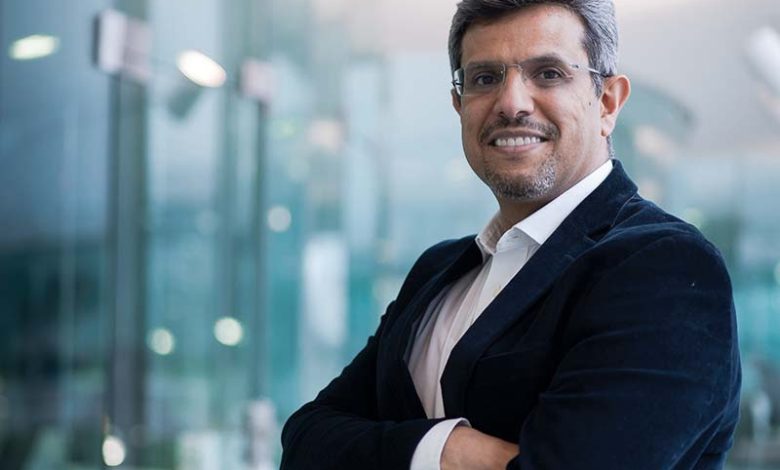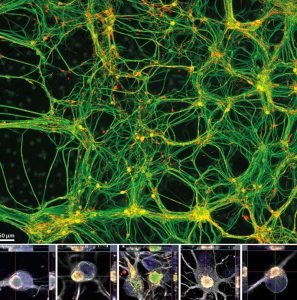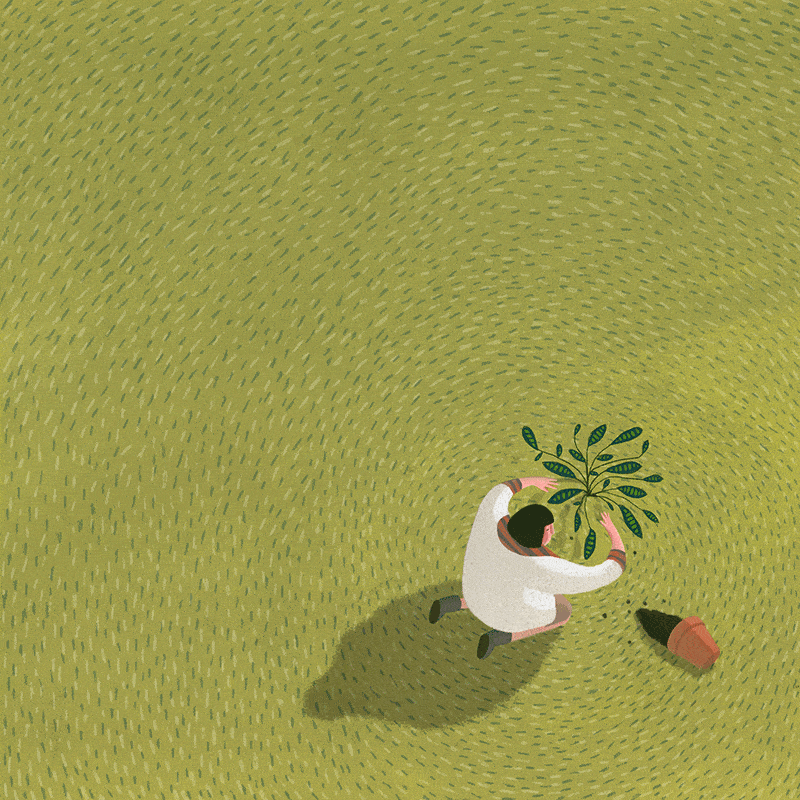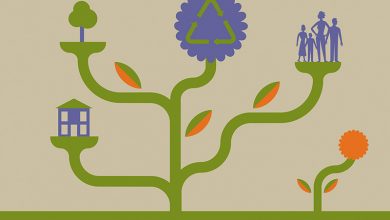Promising prospects for the treatment of neurological diseases
Hilal Al-Ashwal

From his distinguished laboratory in Lausanne, Switzerland, Dr. Hilal Al-Ashwal seeks to identify and analyze the molecular changes that cause diseases of aging, especially Alzheimer's, Parkinson's and Huntington, and to develop innovative methods for early diagnosis of these diseases, and new strategies for drugs that limit their development after diagnosis.
In that laboratory (Laboratory of Molecular and Chemical Biology of Neurodegradation of the Brain Center at the Federal Institute of Technology), Dr. Al-Ashwal believes in an interview with the journal (Scientific Progress) that "any scientific breakthrough in knowing the causes of any of these diseases will open new horizons, and pave the way for progress in the diagnosis and treatment of other diseases, and most neurodegenerative diseases."
One of the most important factors in common among these diseases is that one of their main causes is changes in the structure or functions of certain proteins, which leads to their accumulation and deposition inside or outside neurons, and this leads to disruption of communication between cells in the brain and disruption of their functions, says Dr. Al-Ashwal. Over time, this causes neurodegeneration, death of nerve cells, and brain dysfunction, which leads to various symptoms, from memory loss to difficulty controlling movement, and psychological and physical symptoms that vary from one patient to another, and from one disease to another, according to the person's genetic characteristics, lifestyle and the environment with which he interacts.
His most important contributions with his team in this regard are the development of innovative chemical technologies and tools to decipher the molecular code for brain diseases that result from the deposition of proteins, in addition to the development of models of these diseases in neurons in mice, which are currently used to discover and invent new ways to identify the causes of these diseases and test new drugs to treat them, or limit their development. He and his team are currently developing new ways to detect molecular markers in the blood, or cerebrospinal fluid, for early detection of Parkinson's disease, monitor its progression, and measure the effectiveness of new drugs and treatments.
"They form an important part of the scientific base on which many scientists, research centers and pharmaceutical companies build their research projects, which aim to develop new drugs and methods for diagnosing these diseases," he said. This is also reflected in the number of scientific research and publications that quote from the published laboratory research and strategic partnerships with many pharmaceutical companies and international research centers.
To invest his efforts in this field, Al-Ashwal founded (ND BioSciences SA) in 2019. It is a biotechnology company "whose goal is to translate the research and technologies that emerge from our laboratory and develop them into treatments and methods for the early diagnosis of neurodegenerative diseases."
Promising aspirations
Al-Ashwal hopes to achieve a number of aspirations in the short and long term, in addition to a national dream that still haunts him. In the near term, between five and ten years, he hopes to devise new ways to diagnose and track the progression of these neurological diseases early by testing samples that are easy to take from the patient, such as blood. "Even in the absence of effective drugs to treat these diseases today, early diagnosis will enable people to make future plans for their personal lives and their families, and will give specialists time to test different treatments that may slow the progression of the disease," he says. This is also very important in clinical testing of new drugs because it helps to measure the effectiveness of these drugs to treat these diseases, limit their progression, and identify the most likely patients.
To benefit from some experimental treatments." In the long term, spanning between ten and fifteen years, he hopes to contribute with his team to the creation of new drugs and treatments to treat geriatric diseases and reduce their symptoms and progression.
On a personal level, Al-Ashwal dreams of establishing a national research center in Yemen, especially on the island of Socotra, because of its biodiversity and unique plants of high medical value that represent a rich source for the discovery of new and unique medicines for many incurable diseases.
Kuwait Prize
In 2018, the Kuwait Foundation for the Advancement of Sciences (KFAS) awarded Dr. Al-Ashwal the prestigious annual Kuwait Award in recognition of his research work, which contributed to clarifying the molecular causes and structural changes that cause protein deposits and aggregation, and the mechanisms by which these processes contribute to the cause of neurodegenerative diseases, including Alzheimer's, Parkinson's and Huntington, as well as imuliod diseases. Al-Ashwal is proud of his doctoral research, which was "instrumental in the discovery of new treatments that were later successful (15 years later) in clinical trials and are currently used to treat diseases caused by the deposition of a protein called transthyraten in the heart."
Al-Ashwal believes that it is very nice to honor a person, and to see appreciation and recognition for his efforts, successes, and contributions, especially when this honor comes from prestigious institutions in his field of work or from the Arab world. He says that this type of honor "gives us moral support and motivation to continue to persevere, excel, provide the best in our scientific and research fields, and harness our expertise and achievements to develop science and serve society and humanity. What is more important than the award is to feel that through your scientific and professional achievements you have made a positive impact on the lives of others."
Any scientific breakthrough in the knowledge of the causes of diseases of the nervous system will pave the way for significant progress in the diagnosis and treatment of other diseases, and most neurodegenerative diseases.
The importance of honoring Arab scientists by their homelands and Arab institutions lies in the fact that it highlights distinguished role models as role models and a source of inspiration for future generations. It also enhances their communication with their homelands and colleagues in the Arab world, and opens new doors and horizons for communication, cooperation and work together, and contribute to the development of education and progress in their countries and the Arab world, according to Al-Ashwal.
There are a large number of scientists and researchers inside and outside the Arab world who deserve appreciation and support. He says: "I hope that we will witness more interest in science, education and scientific research in the region, and see a greater number of awards and honoring platforms that shed light on scientists and innovators, especially those in the Arab world, and harness special awards and means of support aimed at developing cooperation frameworks between Arab scientists at home and abroad through projects that take advantage of the unique capabilities and capabilities of Arab scientists, and the rare and rich wealth and resources of the countries of the region to meet the common challenges of Arab countries, and produce discoveries and innovations that contribute to the progress of science and the status of science. The Arab world in the global scientific map."
Scientific Creativity Environment
Al-Ashwal believes that the best way to stimulate the environment of scientific creativity in the Arab world, and encourage Arab researchers and scientists, especially young people, to produce and give in their homelands stems from considering the interest in developing education and scientific research a national project that realizes its importance and is defended by the citizen before the official, so "our scientific policy and the extent of our investment in education, scientific research and our human resources must reflect our strong belief, peoples and governments, in the potential of the youth of the Arab world, and their ability to produce, excel, innovate and compete at all levels, and to contribute effectively to Building and developing knowledge economies and societies capable of facing social, health and security challenges."
In 2018, the Kuwait Foundation for the Advancement of Sciences (KFAS) awarded Dr. Al-Ashwal the Kuwait Award in recognition of his work in clarifying the molecular causes and structural changes that lead to neurodegenerative diseases.
To enhance the role of scientific research and researchers in developing all areas of life in the Arab world, we need four things: the first is influential institutions that defend the agendas of education and scientific research in the Arab world; the second is clear and long-term educational and research strategies based on qualitative potentials and natural resources, and the needs and development priorities of each country; and the third is the creation of an integrated research system in the fields of science and technology, the establishment of specialized funds to fund research and development and the employment of research outputs to serve policies. The fourth thing is the contribution of businessmen and private economic institutions in supporting research and development, as happens in developed countries, by allocating a specific percentage of their profits or wealth to support research and development in areas of interest to them and support innovation and startups. The role of the private sector in this field in the Arab world is completely absent, whether in terms of supporting scientific research, or enabling researchers and innovators to develop and market their ideas and innovations.
The extent to which governments invest in education, research and scientific production reflects the extent of their belief in the capabilities of young people and their role in making the future, the presence or absence of a clear vision and systematic work to plan the future of their countries, and their desire to catch up with developed countries through distinguished national projects. "This requires the arms and minds of generations who are qualified not only for production but also for creativity and innovation without borders."
Al-Ashwal believes that investing in education, people, R&D infrastructure, and the ability to produce knowledge and innovation are the most important elements of survival, and the only way to meet the challenges of this time. "If we don't pay attention to education, scientific research and development, we will remain just countries and peoples racing and boasting about consumption, imitation and our unique past."
Acquired brains
Al-Ashwal starts with a talk about the bleeding of Arab brains, their migration, and even their displacement. He believes that "most Arab minds love to stay in their homelands and among their people, and want to contribute to their development, and that they will choose to return if they are created with an environment that values their potential and sacrifices and enables them to practice their work and research within the framework of systems based on efficiency, production and excellence, which gives them a sense of stability and job protection based on professional standards to which everyone is equally subject."
Is it time to accept the idea of brain drain to the West, and that it will continue at least for ten years?
The next twentieth? Al-Ashwal answers yes, but he believes that it is necessary to focus on finding tools, means and material support that facilitate the engagement of the Arab diaspora, and benefit from their expertise, resources and professional networks for the benefit of their countries and the region. "The development of means of communication and communication provides the possibility of engaging them, exchanging knowledge and experience and collaborating with them effectively, without the need for them to physically return to their home countries or the region. What is lacking is the sincere political will on the part of leaders and governments in the region to involve Arab scientists and immigrant minds in the process of development in their countries and the region."
0
According to Al-Ashwal, the Arab world has qualitative characteristics and wealth that enable its scientists to conduct research that is not easy to conduct in other countries. He believes that "no Arab country, regardless of its wealth, can achieve a sustainable scientific and industrial renaissance in light of the absence of security and stability and the continued deterioration of educational institutions and the scientific research sector in neighboring countries, because there is no Arab country today that possesses all the qualitative characteristics, including material and human capabilities and natural resources that make it distinguished from developed countries that have distinctive infrastructure, and allocate high percentages of its national income to support research in all fields."
Al-Ashwal suggests that wealthy Arab states such as the Gulf Cooperation Council (GCC) could slow the brain drain from the region, turning them into "acquired brains" that would bring significant benefits to all countries in the region. This can be done by retaining talent and skilled workforce from neighboring countries in the region, and providing them with suitable employment opportunities in universities and scientific institutions, which will allow them to maintain their scientific and professional connections with their colleagues and with scientific and governmental institutions in their home countries. Staying in the region also increases their chances of one day returning to their countries of origin.
Honoring Arab researchers gives them moral support and motivation to continue to excel, and to harness their expertise and achievements to develop science and serve society and humanity. What is more important than any award is the researcher's sense of positive impact of his achievements in the lives of others.
Empowering women scientifically
The role of Arab women in the scientific fields has taken a large share of the dialogue with Dr. Al-Ashwal, who believes that this presence is strong in the Arab world and globally. The evidence is that "a large number of female scientists of Arab origin have held high scientific positions in the most prestigious universities in the world, and the appreciation, honor and awards they receive from scientific and professional institutions in all fields. In the Arab world, we find a high demand from girls in the fields of science and engineering, and their percentages in most scientific fields are equal to males, if not surpass them, and women occupy leadership positions in many Arab universities."
Over the past six decades, Arab women have played an important leadership role and distinguished contributions to the development of the educational and research system in Arab countries. The number of women in leadership positions in universities, research and ministerial centres is still low compared to men, due to many factors that may vary from country to country, which is unfair to women.
"The problem is not in women or their absence in scientific fields, but in the cultures of some Arab societies that do not enable women to compete fairly with their male brothers, and continue to marginalize them in decision-making areas. Women represent half of society and no society can advance and catch up with development, construction, and achieving health, economic and political security in light of policies and practices that marginalize the role and capabilities of half of society."
There is no problem with the absence of women from scientific fields, but in the cultures of some Arab societies that do not enable women to compete fairly with their male brothers, and continue to marginalize them from decision-making fields.
Global Arab Cooperation
In 2004, Al-Ashwal received several offers to work at prestigious universities and research centers in the United States, but opted for admission to the Swiss Federal Institute of Technology in Lausanne. On a personal level, "I thought that being with my family in Switzerland would bring us closer to our people in Yemen, and increase the chances of meeting us and contributing to serving the country and the region. This is what actually happened until the war broke out in Yemen."
On the cooperation between QEERI and the Arab countries, he said: "Since 2006, I have been able to work with a large number of Arab colleagues on projects aimed at developing higher education and research in the Arab world, and providing education and training opportunities for Arab students, especially in the fields of neurosciences, in addition to a number of consulting positions in Qatar, where I worked for two years as Executive Director of Qatar National Institute of Biomedical Sciences." He hoped to make an effective contribution to the service of his country, but he could not do so "because the development of higher education and human capabilities was not a priority for the concerned authorities, and then this was completely absent with the outbreak of war in it."
At the research and professional level, joining the Swiss Federal Institute of Technology in Lausanne provided him with rare opportunities that converged with his research and professional projects and ambitions, including complete freedom to form his research team and program according to his personal interests, scientific and research goals and ambitions, in addition to working in a prestigious research institution that attracts the best talent and provides generous resources and research facilities equipped with the latest technology, which later enabled him to invest in new risky research ideas and projects, and expand into other scientific fields outside his field of specialization. This has contributed to the expansion of his field and the opening of new horizons based on his personal scientific ideas and desires, without external financial support being the main course of his research work.
In addition to the monthly stipend, the institute provides Al-Ashwal with generous sums each year to support his research projects, and he has complete freedom in how they are used. He believes that "this is what distinguishes the Swiss system from the American system and the system prevailing in the Arab countries, where most of what universities may provide to the researcher is the monthly salary, which forces him to rely entirely on national and private research institutions and funds that provide financial support for projects that serve their priorities and not the researcher's priorities and scientific ambitions."

Scientific career
Al-Ashwal grew up in a family that reveres education, respects the learner, and appreciates the role of education in building the personality of the individual and enabling him to be a successful and effective figure in society. and deprived his father
His mother has access to education, but they have devoted their lives and everything they have to their children's education.
When he was fifteen, al-Ashwal left Yemen for New York City to complete his high school and then university education. "It was not easy psychologically and living to be abroad at such an age. I lived in New York with my brother, who is a year older than me, and we had no grants or sources of income, so we had to work 30-25 hours a week, and do several jobs to cover living expenses. Many days we doubted that we would be able to complete our education. We thought about dropping out of school several times, and the only deterrent was that we were aware of the sacrifices made by the father, may God have mercy on him, and the mother, may God protect her, in order to learn and be an example for our brothers and we did not accept to disappoint them in us."
What enabled him to overcome these challenges was not only diligence and determination, but also because he was lucky, as he found at all stages of his educational career someone to stand by him, support him and believe in his abilities that he may not have noticed in the crowd of feelings and fear of the future. "First the parents played this role, then my older brother, then my wife, my professors and my research supervisors, then my children, my research team members and friends."
All this enabled him to achieve simple successes that contributed to building his self-confidence and potential, to end the journey of the impossible, and begin the journey of ambition and the possible. "In the beginning, my desire was to join medical school to become a doctor, because the profession of doctor or engineer was then considered a symbol of success and excellence. In the second year of my university studies, I joined as a volunteer in a research laboratory run by one of my professors, and this was a pivotal point of change in my life and future, as I discovered during my work in the laboratory my passion for scientific research because it is a dynamic field devoid of routine, due to constant competition and daily discoveries that require you to follow, develop and renew your research plans, and it is also a profession that provides you with the freedom to think, innovate and cooperate with scientists of all nationalities to transform your ideas into research projects that you have complete freedom in Apply".
In addition, Al-Ashwal enjoys working with a team of aspiring students and scientists, with the constant hope that one day they will all be able to make discoveries that may transform the field of health, and devise ways to early detection and treatment of diseases of aging and dementia. "This is what motivates us to go to work and work hard and excel in our work every day. I hope that the day will come when our parents will not take away the joy of living with their children and grandchildren, sharing their memories and playing with them. "Nervous system diseases like Alzheimer's and Parkinson's steal these beautiful moments from thousands of seniors every day, and we work day and night to fight them and devise new ways to treat them."
Pioneering Studies
Over the past few months, Dr. Al-Ashwal and his team have conducted three pioneering studies in the field of neurological diseases. The first of these studies was a new look at how genetic mutations contribute to Lewy body dementia and Parkinson's disease. The study aimed to find out why a new mutation in the amino acid protein alpha-synuclein aSyn causes more severe Lewy body disease in the cortical and hippocampal areas of the brain than in areas of the brain that are commonly affected by Parkinson's disease. It showed that the new mutation may affect alpha-synuclein structure, aggregation and pathogenesis through mechanisms distinct from those of other mutations. The study helps to uncover the various mechanisms that contribute to neurodegeneration, the progression of Parkinson's disease and other neurodegenerative diseases.
The second study was to unmask the structure of the aggregates that cause Huntington's disease. Although we know which protein collects and causes neurodegeneration in Huntington's disease, we don't have a detailed picture of how Huntington's proteins clump together to form these clumps. This study contributes to addressing this knowledge gap. For the first time, the study was able to create a picture of how Huntington's proteins interact with each other and combine to form the high-order groups we see in the brain. This knowledge paves the way for new approaches to determine the structure of these populations at molecular levels, and to develop new strategies to attack and remove these masses from the brain.
Diseases of the nervous system such as Alzheimer's and Parkinson's steal every day the pleasure of millions of elderly people enjoying beautiful moments with their children and grandchildren, and we work day and night to fight them and devise new ways to treat them.
The third study was titled Development of new tools to investigate and redefine the pathology of Parkinson's disease. Our ability to visualize the formation of protein groups in the brain has shaped our understanding of neurodegenerative diseases. The discovery and quantification of these protein aggregates is also used to evaluate the effectiveness of new treatments. However, most of the tools currently used to visualize protein groups in the brain cannot capture the different types of clumps in patients' brains. Over the past four years, we have developed a large number of new tools (antibodies) that, when used together, allow more comprehensive visualization and analysis of the diversity of the pathogenesis of the brain. This means that we can now get an accurate picture and accurately calculate all the totals in the brain. This will also enable us to have a better understanding of whether the clinical variation of the disease can be explained by differences in the distribution of different types of protein groups or their location in the brain. Understanding these differences may pave the way for new diagnostic tools for early detection of Parkinson's disease or to monitor how the disease progresses over time.
Personal Biography: Hilal Ahmed Naji Al-Ashwal
- Professor and Director of the Laboratory of Molecular and Chemical Biology of Neurodegradation at the Brain Center of the Federal Institute of Technology in Lausanne, Switzerland since 2005.
- Founder and Chief Scientific Officer of ND BioSciences, a biotechnology company developing innovative treatments and diagnoses for neurodegenerative diseases including Alzheimer's, Parkinson's and dementia.
- He was named to the list of one hundred influencers in the French-speaking Swiss regions by the Swiss business magazine L'Hebdo.
- He was named by the World Economic Forum as one of the young global leaders.
- He won the Kuwait Award in Basic Sciences (Biology) in 2018 awarded by the Kuwait Foundation for the Advancement of Sciences (KFAS).
- He received an award in honor of scientific and technological innovation in 2020.
- He has served as a consultant to Qatar Foundation and Executive Director of Qatar National Biomedical Research Institute (QBRI) (2014-2016), and has been an active member of several national projects and research institutions such as Qatargenom, Qatar Biobank, and advisory boards for a number of universities and research funds.
- He has a number of patents, published more than 200 scientific papers, and has been quoted 24,000 times so far.
Abdullah Badran's dialogue






